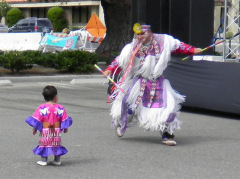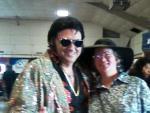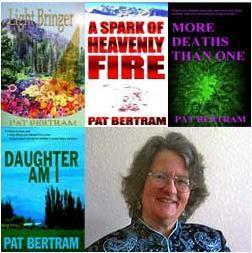Pat Bertram's Blog, page 256
October 11, 2012
Twisting Time is Here: The Power of Saying Yes
 A few years ago I developed a new philosophy: say yes. When people ask me to do something or invite me somewhere or suggest a course of action that I would not normally have considered, I try to say yes instead of immediately dismissing the idea as I once would have done. I’d hoped that by opening myself to diverse activities, I would spark new interests, maybe even twist off my usual path onto a new path of living. So, far, that hasn’t happened. I still don’t have much life in my life or spring in my step, though I don’t know whether these are lingering effects of grief or simply a sign that I haven’t yet found something to be passionate about.
A few years ago I developed a new philosophy: say yes. When people ask me to do something or invite me somewhere or suggest a course of action that I would not normally have considered, I try to say yes instead of immediately dismissing the idea as I once would have done. I’d hoped that by opening myself to diverse activities, I would spark new interests, maybe even twist off my usual path onto a new path of living. So, far, that hasn’t happened. I still don’t have much life in my life or spring in my step, though I don’t know whether these are lingering effects of grief or simply a sign that I haven’t yet found something to be passionate about.
One of my most recent yeses lead to yoga classes, something I had absolutely no interest in, especially since I had no interest in twisting myself into uncomfortable positions. The point of these particular classes is to open oneself up, to breathe, to be, which falls right in line with my latest outlook, which I found interesting. I’ve been pausing in my desert walks to do a few of the breathing exercises (the standing ones), opening myself to the universe, and then saying my affirmation: “I am happy. I am being me. I am where I am supposed to be.” And for a while, I am happy, or at least at peace.
Another yes landed me at twist party for Chubby Checker’s 71st birthday. It was actually a concert, but everyone danced in the aisles, and a couple of times Chubby Checker came down off the stage and joined us. We also sang happy birthday to him, and I found singing to a singer corny enough to be amusing. (Amazing — 71 and still able to perform for 75 minutes and more.)
but everyone danced in the aisles, and a couple of times Chubby Checker came down off the stage and joined us. We also sang happy birthday to him, and I found singing to a singer corny enough to be amusing. (Amazing — 71 and still able to perform for 75 minutes and more.)
 Other recent yeses took me to see the top-rated Elvis tribute artist in the world and a war dance demonstration.
Other recent yeses took me to see the top-rated Elvis tribute artist in the world and a war dance demonstration.
None of these yeses twisted my life around, changed my thinking, or added anything besides an hour or so of diversion, but still, I’ll keep saying yes. Anything can happen, and perhaps that possibility is the real value of saying yes.
***
Pat Bertram is the author of the conspiracy novels Light Bringer, More Deaths Than One, A Spark of Heavenly Fire, and Daughter Am I. Bertram is also the author of Grief: The Great Yearning, “an exquisite book, wrenching to read, and at the same time full of profound truths.”
Tagged: Chubby Checker, Elvis tribute artist, saying yes, the power of saying yes, twisting, war dance, yoga

October 10, 2012
Being is Reason Enough for Living
 I saw the 1993 movie Indian Summer the other day, and one scene still haunts me. Alan Arkin takes Diane Lane, whose husband has been dead a year, to see a house on the lake. He tells her the owner died fifteen years previously and, abiding by the old guy’s wishes, he dropped the guy’s body in the center of the lake. The guy’s wife continued to live in the house, and fifteen years later, when she died, Arkin “buried” her next to her husband. Arkin say he should simply have dropped the wife in the lake when the husband died as a not very subtle way of telling Lane to get on with her life.
I saw the 1993 movie Indian Summer the other day, and one scene still haunts me. Alan Arkin takes Diane Lane, whose husband has been dead a year, to see a house on the lake. He tells her the owner died fifteen years previously and, abiding by the old guy’s wishes, he dropped the guy’s body in the center of the lake. The guy’s wife continued to live in the house, and fifteen years later, when she died, Arkin “buried” her next to her husband. Arkin say he should simply have dropped the wife in the lake when the husband died as a not very subtle way of telling Lane to get on with her life.
Oddly, the reinforcement of the idea that after a year we bereft are supposed to set aside our grief and get on with our life (get a guy, in other words) didn’t bother me as much as the implication that the old woman wasted her life by living at the lake alone.
Is living alone a waste? Not everyone gets to be with someone, and even those who do get to be with someone for a while don’t always get to live out their life with that person. So does that mean their lives are a waste? Not everyone is gifted with friends or has the gift of making friends. Does that mean the lives of the friendless are a waste? We’re told repeatedly in songs, movies, stories, poems, greeting cards, that love makes the world go round. But if love doesn’t come to you, does that mean you should just get off the world and let it go round without you?
If living alone is a waste, does that mean every minute you’re not with someone, anyone, you’re wasting your life? Of course not. So what is the break off point? It’s okay to be alone for a day or two? A week? A year? Is it better to be with someone you hate just so that you’re not alone? I don’t believe that, and I hope you don’t either.
Maybe Arkin’s character thought that being isolated made the old woman’s life a waste. As long as her husband was alive, apparently living by the lake was okay, but when he died, what was she supposed to do — give up her cherished home, the clean air, closeness to nature for a dubious life in the city? And if she did move, what would keep her from being even more isolated? Some of the loneliest people are those who live in the midst of others.
Or maybe Arkin’s character assumed the woman was unhappy, though sadness isn’t a reason to think her life was worthless. Happiness itself doesn’t make life worthwhile — it only feels that way.
I don’t suppose this scene would have bothered me so much if I weren’t struggling with these questions in my own life. There is a good chance I will live out the rest of my life alone. That doesn’t mean — can’t mean — my life has no worth. It would be a pathetic state of affairs if being with someone is the only thing that makes life worthwhile.
Being is reason enough for living (which Alan Arkin’s character, the supposedly wise old Unca Lou should have known). Even if we are blessed with love and friendship, the truth still remains: our only obligation to life is to live the best we can for as long as we can — to simply “be.”
***
Pat Bertram is the author of the conspiracy novels Light Bringer, More Deaths Than One, A Spark of Heavenly Fire, and Daughter Am I. Bertram is also the author of Grief: The Great Yearning, “an exquisite book, wrenching to read, and at the same time full of profound truths.”
Tagged: Alan Arkin, Diane Lane, indian summer, love makes the world go round, reason for living, what makes life worthwhile

October 9, 2012
The Wonder of Us
 A friend told me that she almost died in her early twenties. She said she thought she had been spared because one of her as yet unborn offspring (my word, not hers) or their offspring would do something vital. Perhaps, for example, her young granddaughter will grow up to be president. (Frankly, I think she shouldn’t set her sights so low.) It made me sad that she thought her importance to the world lay not in herself, but in her grandchildren, and it got me to thinking about what makes us important.
A friend told me that she almost died in her early twenties. She said she thought she had been spared because one of her as yet unborn offspring (my word, not hers) or their offspring would do something vital. Perhaps, for example, her young granddaughter will grow up to be president. (Frankly, I think she shouldn’t set her sights so low.) It made me sad that she thought her importance to the world lay not in herself, but in her grandchildren, and it got me to thinking about what makes us important.
Most of us will never be known outside of our circle of family and friends, will never even have fifteen minutes of fame. Most of us will never change the world or make an earthshaking discovery. Most of us will never be wildly successful, though many of us will be quietly successful — at living, if nothing else. Most of us will never satisfy all our dreams, though we will be mostly satisfied with the dreams that do come true. In other words, in the eyes of the world, most of us will never be important.
Any yet . . .
We unimportant folks are people of peace. We don’t start wars, don’t start fights, and seldom start arguments. We give more than we take. We nurture more than we smother, help more than hinder, solve more problems than we generate. We create more than we destroy. We try to do the right thing, though we don’t always know what that might be. We appreciate more than we denigrate. We are often kind and seldom mean. We usually give credit where credit is due and don’t demand more credit than we deserve. We are seldom prejudiced, and if we are, we never let our bias get in the way of how we treat others. We are grateful more than we are regretful.
We value a rich life more than we value a life of riches. We care for this world and for the creatures that depend on it. We feast on beauty, though we might not always agree on what is beautiful. (Besides sunsets. We all see the beauty in sunsets. Not one of us has ever looked at a sunset and said, “oh, how hideous.”)
We love more than we hate.
So, even though most of us will never be considered important, we are probably more important to the world than those who are considered important. And that is the wonder of us.
***
Pat Bertram is the author of the conspiracy novels Light Bringer, More Deaths Than One, A Spark of Heavenly Fire, and Daughter Am I. Bertram is also the author of Grief: The Great Yearning, “an exquisite book, wrenching to read, and at the same time full of profound truths.”
Tagged: create not destroy, help not hinder, love not hate, peace not war, rich life vs life of riches, the wonder of us, what makes us important


October 8, 2012
I am a Victim of Content Scraping
 I’d never even heard of content scraping until yesterday when I found my article Why I Write About My Grief posted on two other blogs. The other blogs did not quote the article, nor did they reblog it. (When an article is reblogged, only the first paragraph or so shows up on another blog, with a link back to the original blog.) They stole the entire thing. One of the blogs was hosted by WordPress, so WordPress suspended the blog for violation of services. The other blog was not hosted by WordPress (it’s a self-hosted blog powered by WordPress, which is a completely different matter) so I have no recourse except legal means. Sometimes courts will take action against a “scraper,” but more often than not, if it is an automated theft by special programs rather than copy and paste by humans, there’s not much that can be done since the site will simply disappear and reappear under another name.
I’d never even heard of content scraping until yesterday when I found my article Why I Write About My Grief posted on two other blogs. The other blogs did not quote the article, nor did they reblog it. (When an article is reblogged, only the first paragraph or so shows up on another blog, with a link back to the original blog.) They stole the entire thing. One of the blogs was hosted by WordPress, so WordPress suspended the blog for violation of services. The other blog was not hosted by WordPress (it’s a self-hosted blog powered by WordPress, which is a completely different matter) so I have no recourse except legal means. Sometimes courts will take action against a “scraper,” but more often than not, if it is an automated theft by special programs rather than copy and paste by humans, there’s not much that can be done since the site will simply disappear and reappear under another name.
Apparently, search engines cannot distinguish between scraped content and original content, so the plagiarized content (let’s call it by it’s real name) shows up first in search results since it is the newer content, which makes the theft even more of a problem. If you are the victim of scrapers, there are some things you can do to fight back. First, take the steps outlined in this article from WordPress Support: Content Theft – What to Do. Second, you can follow the suggestions in this article: Content Scrapers – How to Find Out Who is Stealing Your Content & What to Do About It. Third, ignore the situation but take steps to make sure you get the credit.
If you decide on the third option, the easiest way to get at least partial credit for future plagiarized material is to use a link to your own site in your content, such as the link to my grief in article in the first sentence of this blog. Even better, add a promo to the bottom of the blog so that no matter where the article appears, information about you as the author will go along with it. That’s what I decided to do: add a promo to the bottom of my blogs. Regular readers will forgive the intrusion (I hope), new readers will learn a bit about me, and any bot that steals my content will also spread the word about me and my books.
***
 Pat Bertram is the author of the conspiracy novels Light Bringer, More Deaths Than One, A Spark of Heavenly Fire, and Daughter Am I. Bertram is also the author of Grief: The Great Yearning, “an exquisite book, wrenching to read, and at the same time full of profound truths.” All Bertram’s books are available both in print and in ebook format. You can get them online at Second Wind Publishing, Amazon, B&N and Smashwords. At Smashwords, the books are available in all ebook formats including palm reading devices, and you can download the first 20-30% free. Print books can also be ordered from your favorite bookstore.
Pat Bertram is the author of the conspiracy novels Light Bringer, More Deaths Than One, A Spark of Heavenly Fire, and Daughter Am I. Bertram is also the author of Grief: The Great Yearning, “an exquisite book, wrenching to read, and at the same time full of profound truths.” All Bertram’s books are available both in print and in ebook format. You can get them online at Second Wind Publishing, Amazon, B&N and Smashwords. At Smashwords, the books are available in all ebook formats including palm reading devices, and you can download the first 20-30% free. Print books can also be ordered from your favorite bookstore.
Tagged: content scraping, plagiarism, reblogging, scraper, WordPress


October 7, 2012
Sample Sunday
If you’ve been wanting to check out my books, now is your chance to read the first chapter of each novel online.
 Bob Stark returns to Denver after 18 years in SE Asia to discover that the mother he buried before he left is dead again. At her new funeral, he sees . . . himself. Is his other self a hoaxer, or is something more sinister going on?
Bob Stark returns to Denver after 18 years in SE Asia to discover that the mother he buried before he left is dead again. At her new funeral, he sees . . . himself. Is his other self a hoaxer, or is something more sinister going on?
Click here to read the first chapter: More Deaths Than One
***
 In quarantined Colorado, where hundreds of thousands of people are dying from an unstoppable, bio-engineered disease, investigative reporter Greg Pullman risks everything to discover the truth: Who unleashed the deadly organism? And why?
In quarantined Colorado, where hundreds of thousands of people are dying from an unstoppable, bio-engineered disease, investigative reporter Greg Pullman risks everything to discover the truth: Who unleashed the deadly organism? And why?
Click here to read the first chapter of: A Spark of Heavenly Fire
***
 When twenty-five-year-old Mary Stuart learns she inherited a farm from her recently murdered grandparents — grandparents her father claimed had died before she was born — she becomes obsessed with finding out who they were and why someone wanted them dead.
When twenty-five-year-old Mary Stuart learns she inherited a farm from her recently murdered grandparents — grandparents her father claimed had died before she was born — she becomes obsessed with finding out who they were and why someone wanted them dead.
Click here to read the first chapter of: Daughter Am I
***
 Thirty-seven years after being abandoned on the doorstep of a remote cabin in Colorado, Becka Johnson returns to try to discover her identity, but she only finds more questions. Who has been looking for her all those years? And why are those same people interested in fellow newcomer Philip Hansen?
Thirty-seven years after being abandoned on the doorstep of a remote cabin in Colorado, Becka Johnson returns to try to discover her identity, but she only finds more questions. Who has been looking for her all those years? And why are those same people interested in fellow newcomer Philip Hansen?
Click here to read the first chapter of: Light Bringer
***
 Pat Bertram is the author of Light Bringer, More Deaths Than One, A Spark of Heavenly Fire, and Daughter Am I.All Bertram’s books are available both in print and in ebook format. You can get them online at Second Wind Publishing, Amazon, B&N and Smashwords. At Smashwords, the books are available in all ebook formats including palm reading devices, and you can download the first 20-30% free!
Pat Bertram is the author of Light Bringer, More Deaths Than One, A Spark of Heavenly Fire, and Daughter Am I.All Bertram’s books are available both in print and in ebook format. You can get them online at Second Wind Publishing, Amazon, B&N and Smashwords. At Smashwords, the books are available in all ebook formats including palm reading devices, and you can download the first 20-30% free!
Tagged: A Spark of Heavenly Fire, Daughter Am I, first chapters, Light Bringer, More Deaths Than One, Pat Bertram

October 6, 2012
Why I Write About My Grief
I started writing about grief no t only to make sense of my own feelings, but also as a rebellion against a society that reveres happiness at all costs. I’d never heard of the sort of all-consuming grief that I experienced except for those who were considered unstable, but I knew I was completely well adjusted, so anything I felt had to be normal.
t only to make sense of my own feelings, but also as a rebellion against a society that reveres happiness at all costs. I’d never heard of the sort of all-consuming grief that I experienced except for those who were considered unstable, but I knew I was completely well adjusted, so anything I felt had to be normal.
To be honest, I never had any intention of getting personal in this blog. I launched it to establish an online presence for when I got published. (After starting this blog, it took a year to find a publisher, although I’d already been on the quest for several years. After acceptance, it took another six months for my books to be published, but I made it!) Those first years of blogging, I wrote about my efforts to get published, what I learned about improving my writing, the novels I read and what I learned about writing from their inadequacies.
After my life mate/soul mate died, everything changed. I’d intended to keep my grief to myself and continue writing innocuous little posts, but I kept stumbling over people’s ignorance of grief. I found this ignorance in people I knew. (I will never forget those blank looks of incomprehension in people’s eyes when, sobbing, I told them about my loss. Sometimes they looked at me as if I were an alien species, or some kind of strange bug.)
And I found this ignorance in books I read.
One novelist dismissed her character’s grief at the death of his wife with a single sentence, “He went through all the five stages of grief.” Anyone who has gone through the multi-faceted grief of losing a soul mate knows that there are dozens of stages of grief (or none at all). You spiral round and round, in a dizzying whirl of emotions, not just shock and anger and sadness, but frustration, bitterness, yearning, hope, helplessness, confusion, loneliness, despair, guilt, questioning, angst over loss of faith, and you keep revisiting each of these emotions, hanging on the best you can, until ideally, you reach a place of peace and life opens up again.
Another novelist had her widow cry for a night then put aside her grief and get on with her life. Believe me, you can’t put aside such grief. It’s not just emotional but also physical, a ripping away of his presence from your soul, a deep-seated panic when your lizard brain realizes that half of your survival unit is gone, a body/mind bewilderment so great you can barely breathe. You don’t control raw grief. Grief controls you.
Not only did I discover that few people had any idea of the scope of such grief, most people selfishly urged the bereft to get on with their lives because they couldn’t bear to see their mother/sister/friend’s sadness.
There is something dreadfully wrong with a society that expects the bereft to hide their grief after a couple of months simply because it makes people uncomfortable to see outward shows of mourning. Seeing grief makes people realize how ephemeral their lives really are, and they can’t handle it (which leaves the bereft, who already feel isolated, totally alone with their sorrow.) It also cracks the facade of our relentlessly glass-half-full society.
Although I am a private person, not given to airing my problems in public, I thought it wrong to continue the charade that life goes on as normal after losing the one person who makes life worth living. So, over the past two-and-a-half years, I have made it my mission to tell the truth about grief. Even though I have mostly reached the stage of peace, and life is opening up again, at least a little bit, grief is still a part of my life. There is a void in my world — an absence — where he once was, and that void shadows me and probably always will. Although his death changed the circumstances of my life, thrusting me into an alien world, grief — living with it, dealing with it, accepting it — changed me . . . forever. It has made me who I am today and who I will become tomorrow — strong, confident, and able to handle anything that comes my way.
Would I prefer to have him in my life? Absolutely. But that is not an option. All I can do, all any of us can do, is deal with what lies before us, regardless of a society that frowns on mourning. It takes three to five years to find a renewed interest in life after such a grievous loss, so the next time you see your mother, father, sister, daughter crying for her/his spouse, deal with it. Just because you’re no longer tearful, be aware that even though you have lost the same person, you have not lost the same connection. If it makes you sad to see her mourning, think how much sadder it is for her to experience that sorrow. Hug her, be there for her. Don’t hurry her through grief. She’ll find her way back to happiness in her own time.
Tagged: death of a soul mate, grief and loss, how long does grief take, mourning, stages of grief, surviving the death of a spouse

October 5, 2012
Meeting the Challenges of the Third Year of Grief
 The challenges we face during the first year after the death of a life mate/soul mate (or any other significant person in our lives who connects us to the world), are too great to enumerate. It’s all we can do to cope with the seemingly endless chores of laying our beloved to rest while dealing with the emotional shock, the physical pain, the psychological affront that are our constant companions. Sometimes the first anniversary of his death is one of peace when we realize that we managed to survive the worst year of our life, but then we wake up to the second year and find a whole other set of challenges to meet.
The challenges we face during the first year after the death of a life mate/soul mate (or any other significant person in our lives who connects us to the world), are too great to enumerate. It’s all we can do to cope with the seemingly endless chores of laying our beloved to rest while dealing with the emotional shock, the physical pain, the psychological affront that are our constant companions. Sometimes the first anniversary of his death is one of peace when we realize that we managed to survive the worst year of our life, but then we wake up to the second year and find a whole other set of challenges to meet.
The five main challenges we face during the second year after the death of a life mate/soul mate are:
1. Trying to understand where he went.
2. Living without him
3. Dealing with continued grief bursts.
4. Finding something to look forward to rather than simply existing.
5. Handling the yearning.
There are other challenges, of course, some unique to each individual, but all the challenges are dealt with the same way: by continuing to feel the pain when it erupts rather than turning away from it to satisfy the concerns of those who don’t understand; by taking care of ourselves even when we don’t see the point; by trying new things.
In other words, we meet the challenges of the second year by living. It sounds simple, but nothing about grief for a life mate/soul mate is simple. By living, we begin to move away from our pain, but we also move away from the person we loved more than any other. For some bereft, this feels like a betrayal of their love — how can you continue to live when life on this earth is denied him? For others, it seems like a betrayal of themselves — how can you become the person you need to be without betraying the person you once were?
The third year of grief seems to be a year of transition with only one new challenge — beginning to rebuild our lives. (We still have upsurges of sadness, still miss our loved one, still yearn for him, but these feelings are not as prominent as they once were.) Most of us no longer feel that continued life is a betrayal of our love because we understand that we had no choice in the matter, either in his death or in our continued life. Nor do we feel we are betraying the person we once were — we are no longer that person, though we have not yet developed into the person we are to become. Most of us are still trying to figure out who that person is and what that person wants and needs.
Many of us third-year bereft are caught in circumstances beyond our control — we are taking care of aged parents, new mothers, grandchildren. Although this transition between our old coupled life and our new life alone seems to be a time of stasis, we are still rebuilding our lives day by day, becoming who we need to be. We are also beginning to look beyond this transitional stage to what will come after, which is a sign of life and hope for the future even if we are not yet feeling hopeful.
By now, some bereft are ready to be in a new relationship, and they too seem to be in a transitional stage — not yet in a relationship but looking for possible partners. In other words, dating. I can’t even begin to go into the challenges such bereft face; it seems an impossible task, to go from where they are to where they want to be.
A few people jump into a relationship too soon, and then have the added grief of an aborted love affair. Some find that while they want emotional intimacy, the would-be partner only wants physical intimacy. Complicating the typical adult dating woes of ex-wives, grown children, incompatible schedules, is the date’s incomprehension of the bereft’s grief. Too often, he doesn’t want to hear about the deceased, which leaves the bereft dangling in an emotional limbo, because how can you have a meaningful relationship with someone who denies that which once gave your life meaning?
Others in this third year of grief are not looking for a new relationship, though they wouldn’t turn love down if it came their way.
Whatever the challenges we bereft have to deal with in this third year of grief, we will meet them as we did all the other challenges we have faced: with courage, perseverance, and strength.
Tagged: betraying the dead, challenges of grief, death of a soul mate, grief and loss, living, loss, third year of grief

October 4, 2012
Should You Spend More Time Writing or More Time Promoting?
 A few month ago, The Taleist Survey of 1007, a survey of 1007 self-published authors made the rounds. That survey tried to explain why some self-publishers make a living by writing and how they do it, but the survey only complicates matters.
A few month ago, The Taleist Survey of 1007, a survey of 1007 self-published authors made the rounds. That survey tried to explain why some self-publishers make a living by writing and how they do it, but the survey only complicates matters.
The survey says that 2/3 of the top earners (those who make a living by writing, which, incidentally, was less than 10% of the total), are women, leaving the impression that women were better at self-publishing than men, but the truth is, women write romance more than men do, and romance sells more than mystery and science fiction and way more than literary fiction.
It also says that “respondents who’d had their work rejected by traditional publishing and then opted to self-publish it were among the lowest earners,” but that “32% of the top Earners tried and failed to get a traditional publishing deal before self-publishing, but now make a living from selling their work.” Huh? What’s the difference between being rejected and failing to get a traditional publishing deal? Even more confusing, 29% of the top earners had an agent. Why? I thought the point of self-publishing was to bypass the traditional route. Or maybe they hope the agent will get them a traditional publishing contract? If so, then apparently, the top earners still aren’t earning enough.
The report also said that the average top earner spent 69% more time writing than the average author outside of the top earners group. The top earners group spent more time writing than they did marketing, and those in the group who spent the least time marketing were making the most money. Out of all respondents, those who spent the most time marketing earned the least.
Bewildering, isn’t it? The survey leaves out a lot of important information, such as: did the top earners promote at the beginning, and once their careers took off, stop promoting in favor of writing? And if they never promoted, how did they sell books without marketing? The only self-publishers I have met who managed to get on the bestsellers lists without doing any promotion at all (they just posted their ebooks on Amazon and waited for sales) were romance writers and some mystery series writers. Romance readers seem to be voracious consumers of books, and the more they buy, the more Amazon will recommend. And it stands to reason that the more books you write the more you will sell.
Once you get in the Amazon loop, you can spend your time writing and let Amazon take care of your marketing, but those writers who don’t hit that particular jackpot have no other option but to promote. Some writers who eschew marketing in favor of writing are publishing more books but still not making money.
So yes, the top earners spend more time writing, but that does not mean that if you spend more time writing you will earn more.
The survey also says that those who get reviews from top reviewers on Amazon make more money than those who don’t get such reviews, but the top reviewers seldom review newly self-published books from unknowns, so again, the question is, which came first — the financial success or the reviews?
Although I am not a self-published writer, such matters interest me. Those of us who are published by small presses have many of the same concerns as the self-published since for the most part neither group has a has a publicity departments helping us get better known. But this survey has no answers for us, just more questions.
Should we spend more time writing and less time promoting? Or do we need to spend more time promoting and less time writing? Or maybe we should simply spend less time reading such surveys.
Tagged: Amazon top reviewers, promote more and write less, self-publishing, self-publishing survey, write more and promote less

October 3, 2012
Rubicon Ranch: Necropieces — The Story Continues
 Rubicon Ranch is a collaborative and innovative crime series set in the desert community of Rubicon Ranch and is being written online by the authors of Second Wind Publishing. Seven authors, including me, are involved in the current story — Rubicon Ranch: Necropieces.
Rubicon Ranch is a collaborative and innovative crime series set in the desert community of Rubicon Ranch and is being written online by the authors of Second Wind Publishing. Seven authors, including me, are involved in the current story — Rubicon Ranch: Necropieces.
Residents of Rubicon Ranch are finding body parts scattered all over the desert. Who was the victim and why did someone want him so very dead? Everyone in this upscale housing development is hiding something. Everyone has an agenda. Everyone’s life will be different after they have encountered the Rubicon. Rubicon Ranch, that is.
Although some of the characters were introduced in Rubicon Ranch: Riley’s Story, a previous collaboration, Rubicon Ranch: Necropieces is a stand-alone novel. The first chapter will be posted on Monday, June 11, and one chapter will be posted every Monday after that.
We hope you will enjoy seeing the story develop as we write it. Let the mystery begin! Whodunit? No one knows, not even the writers, and we won’t know until the very end!
Chapter 17: Melanie Gray
by Pat Bertram
Melanie stood at the window of her upstairs office, waiting for the photos of Eloy’s dog to finish printing.
Waiting. Always waiting.
Still waiting for Alexander to come home or call, though he had been dead for more than three months. Still waiting for the sheriff to investigate her husband’s accident—if in fact it had been an accident that killed Alexander. Still waiting for her grief to end and her life to begin.
The printer chugged as if deliberating over each line of data. Finally, it spit out the last photo of the puppy. Melanie shook her head at the amateurish product. She’d used high-grade photo copy paper, and the image was a good one, but the picture didn’t have the hard finish of a professionally developed photo.
This was the first place they’d lived where Alexander hadn’t set up a darkroom. She wouldn’t have known how to use the equipment even if she had it, but the absence of the chemical smells underlined the absence of her husband. They were only going to stay in this rental property a short while, just long enough to do the job and move on, and setting up a darkroom wouldn’t be worth the trouble, or so Alexander had claimed. He’d never said where their next job would take them, but he’d seemed anxious about the assignment. And now it didn’t matter. He was dead and she was . . . waiting.
Melanie fanned out the printed photos. Four eight-by-eleven pictures of the puppy, each a different pose, each charming. She printed a fifth page with smaller versions of the images, gathered up the papers, stuffed them in a large Manila envelope, and headed outside.
The cloudless sky was pale blue, and though not particularly hot, the air felt oppressive and humid. The small effort of walking the few steps to Delano Road made Melanie’s skin feel sticky. Normally she would have taken this as a sign that a storm would soon be passing through, but nothing appeared to work normally in Rubicon Ranch.
A curtain in the front window of the Sinclair house twitched. Was someone watching her? Melanie quickened her steps and let out a sigh of relief when she’d passed the house. She hesitated in front of Eloy’s place. The old man’s empty chair stood empty. She’d planned to hand him the photos and slip away before he could get awkwardly avuncular again. So, now what? Wait for him?
Waiting. Always waiting.
Melanie marched to the front door and rang the bell. Silence. Not even a bark or a yip from the puppy. Had something happened to the old man? Maybe he’d meddled in something he shouldn’t have.
In the months she’d lived here, she hadn’t seen Eloy do anything but sit on his front porch and glower at everyone who went by, and the recent change in him seemed suspect. If he’d wanted a dog, a monstrous canine would have better fit his image, but he’d gotten a puppy, for cripe’s sake. And what did he mean when he’d said Morris wouldn’t be bothering her any longer? Why would he make her welfare his concern? Besides, she knew how to take care of herself—Alexander had made sure of that, insisting she take lessons in self-defense and weaponry before they started traveling to dangerous locales. They’d lived in a whole alphabet of perilous countries, from Afghanistan to Zambia, and she’d survived them all. When they’d moved here to Rubicon Ranch, she’d felt safe for the first time in years, but this quiet community had turned out to be the deadliest place of all.
Melanie pressed the doorbell once more on the off chance the old man and young pup were simply napping, but the chimes still elicited no response. Grateful she didn’t have to talk to the old man, she slipped a corner of the envelope beneath the welcome mat to anchor it. Wondering why that most unwelcoming man had a welcome mat on his porch, Melanie trudged to the street.
Moody half walked, half trotted toward her, a hand raised in greeting. “I need to talk to you.”
Melanie waited for her neighbor. “I need to talk to you, too. A couple of weeks ago Morris told me—”
“That Alexander had been taking photos of necropieces for him? I overheard my father talking to you that day. I’m sorry he upset you. He won’t bother you again.”
Anger surged through Melanie, temporarily displacing the sorrow that weighed on her. “Why does everyone think I need protection? I’ve dealt with worse things than a nasty old man who needed to be exterminated.”
Moody held up her hands, palms out. “Sorry. I didn’t realize protection was an issue with you.”
Melanie gritted her teeth to keep from blurting out a denial. She remembered that Moody had once been a psychologist, and any further discussion would give the woman fodder for more assumptions. She pivoted on one foot, getting ready to walk away, then turned back. Her neighbor might be a psychologist and a Sinclair, but she was the only one who could explain why Morris had accused her of killing Alexander.
“Your father mentioned something else that day. He said Riley told you she’d seen me messing with our car.”
Moody blew out a breath. “The bastard lied. Riley only said she’d seen someone messing with the car. That’s all. Never mentioned a name. I didn’t believe her, though. If you knew Riley, you’d know she loved to cause mischief. Even I found it hard to discern when she was telling the truth.”
“But could she have seen someone messing with the car?”
Moody put a finger to her chin and said slowly, “It’s possible. Generally, Riley’s lies were quite detailed—more like stories—but she made the remark about the car in an offhand manner. Are you thinking someone deliberately caused your husband’s accident?”
“Sheriff Bryan told me the accident looked suspicious, but . . .”
“You don’t trust him.”
Melanie focused on the peak of a distant knoll. Did she trust the sheriff? She lowered her gaze to meet Moody’s. “I think he has . . . agendas.”
Moody nodded. “That’s my take on the sheriff, too. I also think he’s on a quest for redemption, whether he’s aware of it yet or not. I’ll let you know if I recall anything else Riley said about your car or Alexander.”
“Thank you.” Melanie turned and started walking up Delano Street toward the desert.
“Wait. Please?”
Melanie stopped.
Waiting. Always waiting.
“I need to warn you about Jake,” Moody said, a new urgency in her voice.
Melanie spun to face the woman. “Are you trying to protect me again? I can take care of myself.”
“Yes. You said. But Jake . . . Jake’s my brother. He wears a cloak of righteousness, but his heart is as black as the rest of the Sinclairs’.”
Melanie frowned at her neighbor. Moody was a Sinclair, too. Could she be warning Melanie that as Morris’s daughter, Moody also had a black heart? A lifetime with Alexander should have prepared her to deal with the Sinclairs, but she sensed nuances of evil in the family next door that made Alexander’s machinations seem like child’s play.
“You don’t believe me,” Moody said flatly.
“Why are you worried about me all of a sudden?”
“I haven’t seen Jake in years, and he just showed up. Supposedly he’s been in the area for several weeks participating in some sort of revival, and he heard about Morris being missing. So now he’s come to . . .”
Interested despite herself, Melanie said, “So now he’s come to—what?”
Moody shrugged, a strange look on her face. Fear, maybe? She glanced toward her house, then fixed an intense gaze on Melanie. “He knows about you. Knows you found the foot yesterday. Don’t believe a word he says. And whatever you do, don’t get yourself in a situation where you are alone with him.”
Melanie watched her neighbor hurry back to Morris’s house. As Moody walked up the driveway, the door opened, and a man walked out.
Melanie gave a start. Morris! Couldn’t be. This man looked younger than the writer. Must be Jake, the son.
Jake glared at Moody, then turned his head toward Melanie. He seemed to study her, the Sinclair dead-fish stare frozen on his face.
And then he smiled.
Melanie fled to the desert. She inhaled the humid, creosote-scented air, trying to remove the stench of the Sinclairs from her nostrils, but no cleansing breath could remove the memory of that evil leer.
Forget the Sinclairs. Focus.
Melanie took a swig of water from her canteen, screwed the cap back on, and reached in her pocket for her little digital camera. Thinking of the last photos she took, the photos of Eloy’s dog, she wondered if her photos would be better if she had professional equipment. She made a mental note to ask the sheriff about her husband’s cameras—Alexander had taken them when he left on that fatal car trip, and they hadn’t been returned to her.
Melanie shot a few photos at random—a jogger in red shorts, a wadded fast food wrapper that looked like a yellow rose nestled in the scrub, a frisky puppy running circles around an old man. Captain and Eloy. Seeing Eloy in the desert again made her shoulders itch. Too much strangeness. Too much change.
She picked her way up the steep rock-strewn track to the top of the knoll, past the place where she’d found Riley’s body stuffed in a television console, past the place where she’d found the foot. She stopped to snap a few shots of the vast desert wilderness spread out before her, a sight that never failed to bring her comfort.
Distant shouts rising above the whine of idling motors caught her attention. She cut to the left until she glimpsed the altercation. Two people, one in red racing gear and one in silver, were standing by a canoe, balancing motor bikes with one hand while gesturing with the other.
“No!” bellowed the red-garbed racer. He hopped on his red bike and sped toward Melanie.
The silver racer got on his bike and chased after his companion. “Someone got chainsaw massacred. We have to call the cops and tell them we found a part of a body.”
“No,” yelled the red racer again. “We can’t. My mom will kill me. I’m supposed to be home looking after my little sister.”
They hurtled past Melanie, still shouting. She took pictures of the two boys, then of the canoe. She’d often seen the abandoned canoe in her treks, but until today, the boat had always been turned upside down. Apparently the boys had found something hidden beneath the canoe. A necropiece.
Could she take a chance that the boys hadn’t seen her, and so pass on calling the sheriff? She hadn’t found the body part, but she felt sure the sheriff would use her presence as an excuse to lay the blame at her feet. She sighed and pulled her phone out of a pocket. Even if the boys didn’t say anything, the sheriff would eventually find out she had been in the vicinity of more death. Not notifying him would seem more suspicious than making the call.
She talked to the dispatcher, explained the situation, described the boys and gave directions on how to find the canoe from Tehachapi Road.
“Wait right there,” the dispatcher said. “Someone will arrive as soon as possible.”
Melanie shoved the phone in her pocket, and shifted from foot to foot.
Waiting. Always waiting.
To hell with that. If the sheriff wanted her, he knew where to find her.
Melanie turned away from the canoe and tramped across the desert expanse, heading toward the storm clouds gathering on the horizon.
Tagged: grief and loss, online novel, Rubicon Ranch, Rubicon Ranch Necropieces, Second Wind Publishing

October 2, 2012
No One to Do Nothing With
 When my life mate/soul mate/best friend died two and a half years ago, people often compared my loss to the death of a pet or an aged grandparent or a sibling (all the while snug in the comfort of their own marriages). Some people compared my loss to their divorce. A couple of people even mystified me by comparing my loss to their struggles with alcoholism. Although these comparisons seemed insensitive at the time (I had previously lost both a sibling and my mother, and those losses in no way resembled what I felt after my soul mate died), I now understand people were reaching out to me, trying to comprehend my grief and to put it into a context they could understand.
When my life mate/soul mate/best friend died two and a half years ago, people often compared my loss to the death of a pet or an aged grandparent or a sibling (all the while snug in the comfort of their own marriages). Some people compared my loss to their divorce. A couple of people even mystified me by comparing my loss to their struggles with alcoholism. Although these comparisons seemed insensitive at the time (I had previously lost both a sibling and my mother, and those losses in no way resembled what I felt after my soul mate died), I now understand people were reaching out to me, trying to comprehend my grief and to put it into a context they could understand.
The wound where his presence was ripped from my soul no longer gapes as widely; the feeling of his total goneness doesn’t haunt me quite so much; the anguish and physical distress has ebbed to an underlying sadness. This easing of grief has unmasked more subtle feelings of loss, and suddenly I can see how this itch to see him once more is comparable to the struggles of an alcoholic. We both have to live — forever —with a deep craving that can never be satisfied, both have an empty feeling that can never be filled, and we both live in a world where others routinely enjoy what we can’t. (Like all comparisons, this one falls short since those who give up drink have to do so from sheer force of will, while my lack is simply a result of fate.)
I hadn’t realized until after he was gone how much I counted on his very presence.
The sound of his voice filled my ears and my mind. From the moment we met until the cancer metastasized into his brain, we talked and talked and talked. We talked about everything — history, books, health, truth, all the many and various things we researched over the years. Though we said everything we needed to say, I still wish for one more word from him.
During silent times, his smiles nourished my soul. Even at the end, in his moments of lucidity before either the pain or the morphine swept him away, he still managed to smile at me. And oh, how I wish for one more smile.
A couple of days ago I wrote about my growing soul hunger, an indefinable need his presence had once satisfied, and now I wonder if that need is . . . nothing. Although we worked and played and talked for more than three decades , we often did nothing together. Were just there, a presence in each other’s lives. As his dying became the focus of our lives, and we couldn’t do much of anything together, not even carry on a conversation, we could still do nothing together, and we often did.
Although I am finding others to fill some of the roles he played in my life, this last is the role no one can fill. I have people to do things with, but I have no one to do nothing with. And, like an alcoholic, the one thing I need is the one thing I can’t have. He was a presence in my life first thing in the morning and the last thing at night. He was a presence in the kitchen when we fixed meals together. He was a presence when we watched movies or ran errands or did chores. He was a presence in my thoughts — because we had spent so much time together, discussing history and current events, our ideas developed in tandem. And we didn’t have to explain ourselves or our state of affairs — we were there and saw the effects life had on the other.
I understand that this sort of companionship is rare, and I feel greedy and perhaps insensitive for even mentioning the lack of his presence in my life, but this is my truth, my experience, my sorrow. No matter how much I wish things were different, these circumstances will never change, but I will. I am becoming more accepting of my situation, more respectful of the soul hunger, more grateful for what I once had. It’s possible someday I will even get used to having no one to do nothing with.
Tagged: dealing with grief, doing nothing, grief and loss, nothing, soul hunger, two and a half years of grief




